Witness for the Prosecution Blu-ray Movie
HomeWitness for the Prosecution Blu-ray Movie 
Kino Lorber | 1957 | 116 min | Not rated | Jul 22, 2014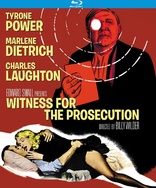
Movie rating
8.2 | / 10 |
Blu-ray rating
| Users | 3.8 | |
| Reviewer | 4.0 | |
| Overall | 3.9 |
Overview
Witness for the Prosecution (1957)
Sir Wilfrid Robarts is an ailing barrister who has been told that he should accept fewer legal cases for the sake of his health. However, he cannot resist defending Leonard Stephen Vole, a man accused of murder whose only alibi is provided by his devoted wife, Christine. The police are convinced of Vole's guilt as he stands to benefit financially from the murder, but Robarts believes that he can prove the man's innocence in court.
Starring: Tyrone Power, Marlene Dietrich, Charles Laughton, Elsa Lanchester, John Williams (II)Director: Billy Wilder
| Film-Noir | Uncertain |
| Drama | Uncertain |
| Thriller | Uncertain |
| Crime | Uncertain |
| Mystery | Uncertain |
Specifications
Video
Video codec: MPEG-4 AVC
Video resolution: 1080p
Aspect ratio: 1.66:1
Original aspect ratio: 1.85:1
Audio
English: DTS-HD Master Audio 2.0 Mono (48kHz, 16-bit)
Subtitles
None
Discs
25GB Blu-ray Disc
Single disc (1 BD)
Playback
Region A (locked)
Review
Rating summary
| Movie | 4.5 | |
| Video | 3.5 | |
| Audio | 4.0 | |
| Extras | 1.0 | |
| Overall | 4.0 |
Witness for the Prosecution Blu-ray Movie Review
Kiss and make-up.
Reviewed by Jeffrey Kauffman July 12, 2014Note: It's difficult to discuss some aspects of the plot of this film without at least hinting at potential spoilers,
and in one paragraph below I actually do more than merely hint. If
you haven't seen Witness for the Prosecution, you may want to skip down to the technical aspects of the
review, below.
There’s a manifest difference between seeing a theatrical presentation and a film, and aside from the more obvious
differences between these media, there’s one that is subliminal but perhaps one of the most important: films have
close-
ups, and that gets the audience—no matter where they’re seated—up close and personal with the subject on the
screen.
That has some built in dangers for properties that rely on disguises or make-up effects. One of the more salient
examples
of this is Anthony Shaffer’s fantastic piece Sleuth
(hopefully the original version will be out on Blu-ray soon), where not every character is exactly who you might
initially think they are. On stage, this artifice works more or less perfectly, at least if it’s performed well and staged so
that
a certain deceit isn’t too evident. In the film, it’s all but impossible not to give away the “twist”, and it deprives the film
of
one of the more spectacular surprises in the annals of mysteries. Much the same problem attends the 1957 film of
Agatha
Christie’s vaunted Witness for the Prosecution, a surprisingly straightforward murder mystery from the pen of
the
undisputed Dame of British suspense writers. Despite press and public acclaim at the time of the film’s release,
accolades
which shied away from divulging the film’s big “twist”, it’s not an especially hard one to figure out as the film trundles
through to its climax. Without posting any potential spoilers here (no such guarantee for some of the content later in this review), suffice it
to say that the film hinges on much the
same
artifice that was used later in Sleuth, and much like the film version of that play, the artifice simply doesn’t hold
up
under the cold, clear light of film close-ups.
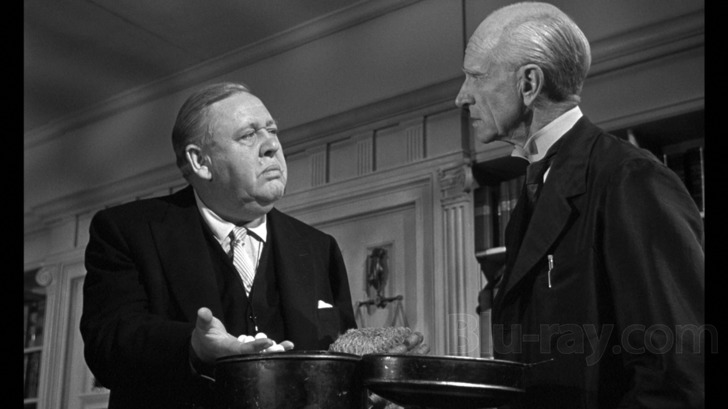
In the brief but highly enjoyable supplement on this Blu-ray which features iconic director (and evident polyglot) Billy Wilder discussing his adaptive efforts on Witness for the Prosecution, he mentions adding all sorts of material which was not in the original Agatha Christie play. This includes the admittedly tangential but just as undeniably entertaining interplay between Sir Wilfrid Robarts (Charles Laughton), a barrister recovering from a serious heart attack (another addition to the film version), and his nagging nurse Miss Plimsoll (Laughton’s real life wife Elsa Lanchester). This bickering, bantering relationship starts out the film and continues to provide comic relief throughout the rest of the proceedings. Sir Robarts has been “paroled, not discharged” from the hospital (as he puts it), and is under strict doctors’ orders—orders enforced by the no-nonsense Miss Plimsoll—to avoid any and all stress, which includes taking any high profile criminal cases.
When an attorney friend of Robarts shows up with a potential client named Leonard Vole (Tyrone Power in his last film appearance), Robarts initially demurs, at least until he spies forbidden cigars in his friend’s pocket. The chance to sneak a secret smoke is enough to at least hear about the case, and that starts the film out on the first of several flashbacks, where Vole discusses what is probably an impending murder charge against him. Vole had befriended an elderly widow named Emily French (Norma Varden), and while he insists the relationship was purely platonic, he similarly confesses that he never told French he was married and also wouldn’t have minded if the wealthy woman had invested in one of his not exactly groundbreaking inventions. Unfortunately for Vole, French had been found severely bludgeoned, Vole was evidently the last person to be seen with her, and even more incriminating, it turns out French had changed her will, leaving her considerable fortune to Vole. Needless to say, Robarts is at least intrigued by the challenge the case offers, though he again initially demurs from accepting it.
A few quick plot machinations ultimately get Robarts completely involved, of course, and it’s at this point that some of Christie’s typically complex plotting comes into play. Vole’s wife is a German expat named Christine (Marlene Dietrich), a former actress who does not seem particularly concerned about all of the brouhaha, especially because she can provide an alibi for her husband. In the first of a series of unexpected developments, though, Robarts and Vole are shocked when Christine turns out to be the titular witness for the prosecution, a situation that would normally be disallowed under spousal privilege, but which is here circumvented by a secret from Christine’s past. Christine’s testimony seems to point unalterably to Vole as French’s killer, but then another unexpected development takes place which places Christine’s testimony in a completely new light.
And here is where we must discuss in some detail the fulcrum upon which Witness for the Prosecution hinges, and why perhaps this film version, for all of its excellence, may frustrate some contemporary viewers (so again, spoilers await in this paragraph). Though it’s offered as a quick aside, the fact that early in the film Christine is identified as a former actress will no doubt prick up the ears of any devoted mystery fan. When an enigmatic woman with a Cockney accent shows up partway through the film with evidence indicating Christine has more than one secret in her background, it seems awfully convenient, especially when the makeup techniques of the day don’t do that good of a job of fooling the audience. (To be fair, evidently 1957 audiences—or at least some of them—were in fact fooled.) It’s nonetheless a commendable effort, one furthered by the remarkable Cockney dialect of the character which both Dietrich and Wilder insisted she performed herself, under Laughton’s tutelage, though rumors continue to swirl to this day that she was dubbed. (I am one of the cynics who still suspects Dietrich is dubbed—simply watch her mouth and it’s clear—to me, anyway—that her lip movements don’t always quite match the dialogue. This may in fact have been done after the shoot without Dietrich's express knowledge.)
While this particular aspect may not be completely successful, it ultimately doesn’t detract very much from what is a fantastically enjoyable film. The inner workings of the Old Bailey are minutely detailed both in production design and actual procedural techniques which are depicted in the film. And Witness for the Prosecution offers an array of wonderfully engaging performances. While it may be stretching things a bit when Laughton calls Power “young man”, the aging matinee idol does rather well in this darker, two-faced role. Dietrich is suitably imperious as Christine, and no matter what the technical issues with her doppelganger might be, she manages to at least embody that woman with a fair degree of panache. But ultimately this is a field day for Laughton and to a slightly lesser extent Lanchester. The two were often accused of forging a marriage of convenience, one which supposedly acted as a “cover” for Laughton’s bisexuality or homosexuality, but that hardly matters here. It’s obvious these two people have a longstanding relationship with each other, and the delightfully real feeling interplay between Robarts and Plimsoll gives Witness for the Prosecution much of its enduring spark.
Witness for the Prosecution Blu-ray Movie, Video Quality 
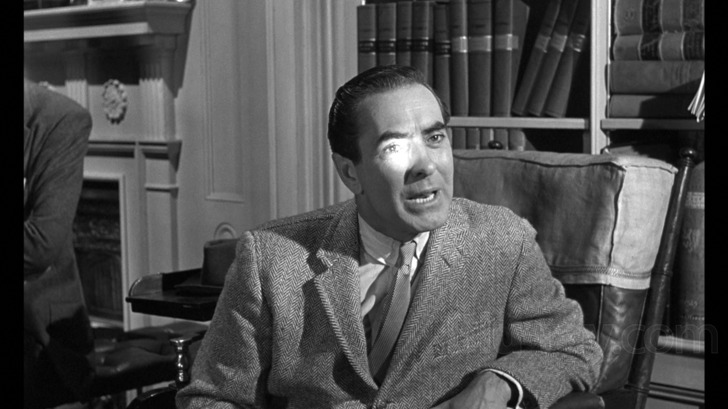
Witness for the Prosecution is presented on Blu-ray by Kino Lorber Studio Classics with an AVC encoded 1080p transfer in 1.66:1. Kino is just the latest label to start licensing deep catalog material from the (former) major studios (perhaps spurred on by Frank Tarzi, who returned to Kino after a stint at Olive Films), and fans have been understandably anxious to know about the quality of these new Blu-rays. I'm frankly just a little conflicted about the proper score for this release, for it's easy to argue a 4.0 if one discounts a few anomalies. I've opted for the lower score in order to indicate that there are a few niggling concerns here in an overall very nice and filmic presentation. While a lot of the film offers superb clarity and contrast, as well as generally convincing black levels and nicely modulated gray scale, there are a number of odd "dupey" looking moments that suddenly creep into several scenes (you'll notice the first one at around the 10 minute mark, when Vole is starting to tell Robarts about his history). These typically just pop up for a few seconds, and then the film reverts to its better looking state. (Look at screencaps 10 and 11 for just a slight indication of some of the lesser quality moments). I never saw Witness for the Prosecution theatrically, so cannot definitively state whether these are inherent, but the bottom line is, they're noticeable and a slight blemish that along with some very minor and transitory compression artifacts afflict an otherwise very nice looking transfer. The image here is nicely stable, with no problems in resolution of fine patterns like Vole's tweed suit jacket. There are also no obvious intrusions of digital revisionism in the image.
Witness for the Prosecution Blu-ray Movie, Audio Quality 
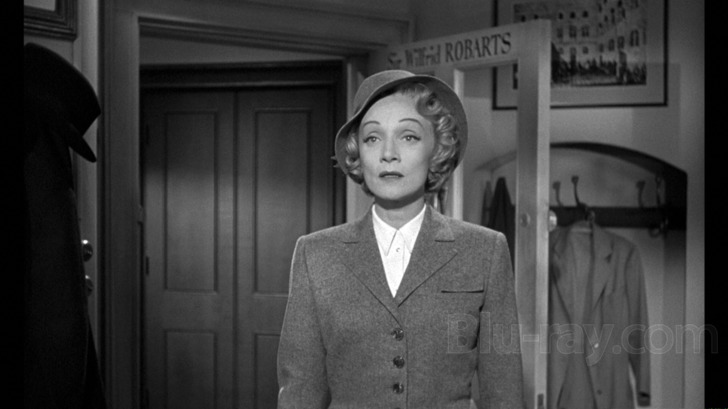
Witness for the Prosecution's lossless DTS-HD Master Audio 2.0 mono mix offers nice support for the film's playful dialogue, along with the occasional sound effect and generally minimalist score (Dietrich does get to sing one song interpolated into the film that is obviously tailor made for her distinctive talents). There's some nice attention to ambient reverb in the large spaces of The Old Bailey, but this is generally an unambitious sound mix that doesn't offer any truly showy moments. Fidelity is excellent and dynamic range has some punch due to a couple of outbursts along the way.
Witness for the Prosecution Blu-ray Movie, Special Features and Extras 

- Billy Wilder Speaks on Witness for the Prosecution (480i; 6:31). The always entertaining Wilder segues from German to French to English pretty well here (not perfectly for you language experts), detailing some of the history behind the project. This is too brief, but highly enjoyable.
- Trailer (1080p; 3:07)
Witness for the Prosecution Blu-ray Movie, Overall Score and Recommendation 
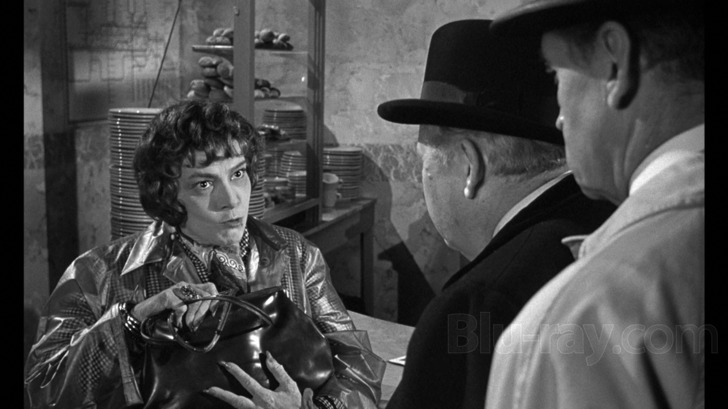
Some viewers may in fact be fooled by the film's central artifice, but my hunch is wiseacre young 'un's who have been brought up on a steady diet of more impressive special effects wizardry are going to be rolling their eyes and asking the not exactly rhetorical question, "Did this really work back in 1957?" Putting aside that perhaps understandable issue, the rest of Witness for the Prosecution works like gangbusters. Laughton and Lanchester are just flat out lovable as a pair of antagonists thrown together by chance, and Power is surprisingly effective as a gigolo. The video here is generally very strong, but a few recurrent issues have led me to score it on what is perhaps the conservative side. Audio is fine, and the main supplement, while brief, is hugely enjoyable. Highly recommended.
Similar titles
Similar titles you might also like

Footsteps in the Fog
1955

The File on Thelma Jordon
1950

The Wrong Man
Warner Archive Collection
1956

The Glass Key
1942

The Big Sleep
Warner Archive Collection
1946

The Lady from Shanghai 4K
1947

The Dark Corner
1946

Calcutta
1946

The Girl Hunters
Limited Edition of 2000
1963

The Letter
Warner Archive Collection
1940

Double Indemnity 4K
1944

Laura
Fox Studio Classics
1944

Motherless Brooklyn
2019

Leave Her to Heaven
1945

I Confess
Warner Archive Collection
1953

The Postman Always Rings Twice
1946

She Played with Fire
1957

Lured
1947

Boomerang
1947

Beyond a Reasonable Doubt
1956
